|
|
|
Sort Order |
|
|
|
Items / Page
|
|
|
|
|
|
|
| Srl | Item |
| 1 |
ID:
086137
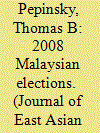

|
|
|
|
|
| Publication |
2009.
|
| Summary/Abstract |
Malaysia's twelfth general elections, held on March 8, 2008, dealt a stunning blow to the incumbent Barisan Nasional regime. For the first time since 1969, the coalition did not receive its customary two-thirds majority in the lower house of parliament. Moreover, the opposition was able to form governments in five out of eleven peninsular Malaysian states. This article uses electoral, economic, and demographic data to test a number of potential explanations for these outcomes. Evidence indicates that the regime's decreased majority is the consequence of non-Malay voters' rejecting the incumbent regime in favor of secular opposition parties.
|
|
|
|
|
|
|
|
|
|
|
|
|
|
|
|
| 2 |
ID:
181823
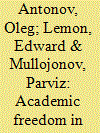

|
|
|
|
|
| Summary/Abstract |
While there have been a number of studies of the political economy of knowledge production in Central Asia, the often exploitative relations between foreign and local researcher, there has been less discussion of what Elizabeth Perry recently described as the ‘scholar–state’ nexus: how authoritarian rule rests on the suppression of independent academics, the ‘educated acquiescence’ of academia or their incorporation into the ‘factory of answers’. Through the concepts of suppression, acquiescence and incorporation, this article examines how restrictions on academic freedom have an impact on knowledge production in Tajikistan.
|
|
|
|
|
|
|
|
|
|
|
|
|
|
|
|
| 3 |
ID:
173909
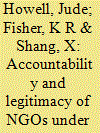

|
|
|
|
|
| Summary/Abstract |
How non-governmental organisations (NGOs) craft accountability and legitimacy in authoritarian states is poorly understood. We put forward a framework of analysis for capturing the processes of making accountability and legitimacy. We introduce the ideas of first- and second-order accountability and stocks of accountability capital. In authoritarian regimes, building second-order accountability through the accumulation of stocks of accountability is crucial for NGOs’ survival and organisational development and as a path towards gaining first-order accountability. Drawing on a decade of fieldwork on child welfare NGOs in China from 2007 to 2017, we select three case studies with long operational trajectories to illustrate processes of crafting legitimacy and accountability. The research contributes empirically and theoretically to the understanding of accountability in NGOs in authoritarian states through the novel analytic framework and case study of China.
|
|
|
|
|
|
|
|
|
|
|
|
|
|
|
|
| 4 |
ID:
165593
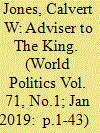

|
|
|
|
|
| Summary/Abstract |
Do experts rationalize and legitimize authoritarian governance? Although research on expert actors in contexts of democracy and international governance is now extensive, scholarly work on their role in authoritarian settings remains limited. This article helps open the black box of authoritarian decision-making by investigating expert advisers in the Arab Gulf monarchies, where ruling elites have enlisted them from top universities and global consulting firms. Qualitative fieldwork combined with three experiments casts doubt on both the rationalization and legitimacy hypotheses and also generates new insights surrounding unintended consequences. On rationalization, the evidence suggests that experts contribute to perverse cycles of overconfidence among authoritarian ruling elites, thereby enabling a belief in state-building shortcuts. On legitimacy, the experiments demonstrate a backfire effect, with experts reducing public support for reform. The author makes theoretical contributions by suggesting important and heretofore unrecognized conflicts and trade-offs across experts’ potential for rationalizing vis-à-vis legitimizing.
|
|
|
|
|
|
|
|
|
|
|
|
|
|
|
|
| 5 |
ID:
178608


|
|
|
|
|
| Summary/Abstract |
The coup attempt of 2016 constitutes a major incision in contemporary Turkish politics. Focusing on the symbolic aspects of the AKP’s authoritarian rule in the direct aftermath of the coup attempt, this article offers a new conceptual framework to analyze three symbolic and discursive strategies that the government employed with the aim to normalize its exceptional and transformative measures: legitimation, narrativization and ritualization. It argues that these strategies contribute to the deepening of the AKP’s authoritarian regime formation and contends that the government’s actions are a reflection of the power struggle between the AKP and the Gülen movement.
|
|
|
|
|
|
|
|
|
|
|
|
|
|
|
|
| 6 |
ID:
190813
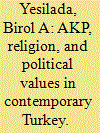

|
|
|
|
|
| Summary/Abstract |
The Justice and Development Party (AKP) came to power in 2002 with the promise of reforms to further democratic consolidation in Turkey. At that time, the AKP represented a rainbow coalition of individuals from the previous Islamist parties and many liberal democrats who were fed up with the failures of old secular political parties. The Turkish public shared their frustrations and overwhelmingly supported the AKP. Unfortunately, these reforms did not last. Today, it is indisputable that under the rule of the AKP, and more specifically, President Recep T. Erdoğan, Turkey has become an authoritarian state defined and shaped by one person. This article explores what these developments mean for the future of Turkish democracy as the country celebrates its centenary, and it includes an examination of whether Turkish political culture is supportive of such changes.
|
|
|
|
|
|
|
|
|
|
|
|
|
|
|
|
| 7 |
ID:
137408


|
|
|
| 8 |
ID:
187792
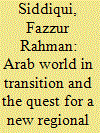

|
|
|
|
|
| Publication |
Chennai, Macmillan Publishers India Pvt Ltd, 2022.
|
| Description |
xii, 242p.hbk
|
| Standard Number |
9789354550713
|
|
|
|
|
|
|
|
|
|
|
|
Copies: C:1/I:0,R:0,Q:0
Circulation
| Accession# | Call# | Current Location | Status | Policy | Location |
| 060258 | 956/SID 060258 | Main | On Shelf | General | |
|
|
|
|
| 9 |
ID:
127117


|
|
|
|
|
| Publication |
2013.
|
| Summary/Abstract |
Since the end of the Cold War, political scientists have radically reexamined the role that elections play in authoritarian contexts. Some argue elections are congruent with authoritarianism and actually help to stabilize non-democratic forms of rule. Others challenge this claim by arguing that elections can function as a mechanism for democratization. We test whether elections have functioned as a mechanism of change or of neo-authoritarian stability in the postcommunist world. We generally find that elections neither promote democracy nor strengthen authoritarianism. However, we do find that in energy-rich states elections promote authoritarianism, though of a somewhat more benign sort. We also find that the mechanisms of electoral participation and competitiveness thought to promote democracy function differently in the postcommunist context and explore this in greater detail through a paired case study of electoral mobilization in Slovakia and Belarus.
|
|
|
|
|
|
|
|
|
|
|
|
|
|
|
|
| 10 |
ID:
187620
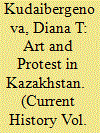

|
|
|
|
|
| Summary/Abstract |
Recent events in Kazakhstan show that political art has the potential to be a potent form of protest in some of the most authoritarian states in contemporary Central Asia. After the collapse of the Soviet Union, artists in Kazakhstan and elsewhere in the region began turning away from the canon of Socialist Realist art, with its sole aim of serving the regime and depicting its visions of the future. New forms of contemporary art emerged, drawing sharp contrasts with official art in form, content, and culture, as more artists insisted on freedom from state patronage and control. In the political upheaval following the resignation of long-ruling President Nursultan Nazarbayev, artists have inspired protests with pointed critiques.
|
|
|
|
|
|
|
|
|
|
|
|
|
|
|
|
| 11 |
ID:
181524
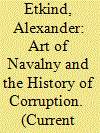

|
|
|
|
|
| Summary/Abstract |
Alexei Navalny has been the most prominent campaigner against Russia’s massive oil-fueled corruption, reaching millions of viewers with witty video exposés. Now imprisoned in a penal colony after returning to Moscow following his recovery from a poisoning, he has made his own bodily suffering a potent symbol of protest, tapping into a deep Russian tradition of dissent.
|
|
|
|
|
|
|
|
|
|
|
|
|
|
|
|
| 12 |
ID:
181872


|
|
|
|
|
| Summary/Abstract |
With the future of fossil fuels looking bleak, resource-dependent regional powers are competing for other means of securing their positions. While some are striking new alliances—even with Israel— they are also redoubling efforts to stamp out democratic voices at home and abroad.
|
|
|
|
|
|
|
|
|
|
|
|
|
|
|
|
| 13 |
ID:
096621
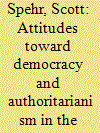

|
|
|
| 14 |
ID:
105246
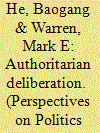

|
|
|
|
|
| Publication |
2011.
|
| Summary/Abstract |
Authoritarian rule in China is now permeated by a wide variety of deliberative practices. These practices combine authoritarian concentrations of power with deliberative influence, producing the apparent anomaly of authoritarian deliberation. Although deliberation is usually associated with democracy, they are distinct phenomena. Democracy involves the inclusion of individuals in matters that affect them through distributions of empowerments such as votes and rights. Deliberation is a mode of communication involving persuasion-based influence. Combinations of non-inclusive power and deliberative influence-authoritarian deliberation-are readily identifiable in China, probably reflecting failures of command authoritarianism under the conditions of complexity and pluralism produced by market-oriented development. The concept of authoritarian deliberation frames two possible trajectories of political development in China: the increasing use of deliberative practices stabilizes and strengthens authoritarian rule, or deliberative practices serve as a leading edge of democratization.
|
|
|
|
|
|
|
|
|
|
|
|
|
|
|
|
| 15 |
ID:
149735
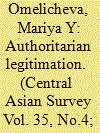

|
|
|
|
|
| Summary/Abstract |
What are the sources of authoritarian persistence in Central Asia? This study explores the argument that authoritarian regimes persist through effective authoritarian legitimation. Drawing on the theory and analysis of discourse, it develops an approach to authoritarian legitimation and examines discursive appeals to legitimacy by the Kazakh and Uzbek presidents. The study also assesses the effectiveness of the presidential discourses of legitimacy for public perception of the governing regimes in Kazakhstan and Uzbekistan. This research shows that by defining what constitutes legitimate power and presenting political rule as consistent with this definition, authoritarian governments can foster certain modes of reasoning and evaluation among citizens, and create possibilities for their acceptance of the regime as ‘right’ or ‘proper’.
|
|
|
|
|
|
|
|
|
|
|
|
|
|
|
|
| 16 |
ID:
168495


|
|
|
|
|
| Summary/Abstract |
This article examines Turkey’s authoritarian state surveillance regime by developing the concept of the authoritarian surveillant assemblage (ASA), building on and expanding the concept of the surveillant assemblage (SA). Turkey’s ASA is the outcome of diverse surveillance systems, which continuously expand their reach, form new connections and incorporate new actors. These systems include a protest and dissent surveillance system, an internet surveillance system, a synoptic media surveillance system and an informant–collaborator surveillance system. Turkey’s ASA is controlled by the Turkish state and serves its repressive interests. Although pivotal in emphasizing the complexity of surveillance connections and increasing diversification of and collaboration among surveillance actors, the SA model of surveillance puts the main emphasis on decentralized, uncoordinated and multifaceted forms of surveillance, and does not offer sufficient analytical space to understand how an authoritarian state could coordinate diverse surveillance systems and use it for the overarching purpose of control. The article draws on Michael Mann’s theory of state power and the authoritarian state to address these limitations of the SA and conceptualize the ASA. It shows how the diverse systems of Turkey’s ASA work in concert with one another under the hierarchical command of Erdoğan’s Justice and Development Party (AKP) to control the population and suppress dissent.
|
|
|
|
|
|
|
|
|
|
|
|
|
|
|
|
| 17 |
ID:
032538
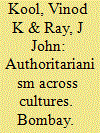

|
|
|
|
|
| Publication |
Bombay, Himalaya Publishing House, 1983.
|
| Description |
xvi, 198p.
|
|
|
|
|
|
|
|
|
|
|
|
Copies: C:1/I:0,R:0,Q:0
Circulation
| Accession# | Call# | Current Location | Status | Policy | Location |
| 027475 | 321.9/KOO 027475 | Main | On Shelf | General | |
|
|
|
|
| 18 |
ID:
099186
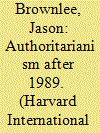

|
|
|
| 19 |
ID:
106786
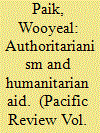

|
|
|
|
|
| Publication |
2011.
|
| Summary/Abstract |
Severe natural disasters encourage the international community to donate humanitarian aid (materials and personnel) to the affected country, which is critical for its human security. Some authoritarian regimes, however, rationally reject such aid despite the dire situation of their people. When an authoritarian regime decides whether to accept foreign humanitarian aid for severe natural disasters or not, it considers two political factors: (1) the risk and (2) the need to accept aid, which is a type of exogenous shock that may threaten the stability of the regime and its survival. This paper considers the factors of risk (regime type, domestic struggle, and international pressure) as inherent and contingent determinants of regime stability, and the need factors by looking at the different types of sources from which the regime gains its legitimacy (electoral mandate, economic development, or ideology). If the risk is less and the need is more, the regime is more likely to accept the aid, otherwise not. The two authoritarian regimes hit by severe natural disasters - the 2008 Sichuan earthquake in China and the 2008 Cyclone Nargis-caused floods in Myanmar - are considered as salient cases for the external variation between authoritarian regimes. This paper also finds some critical internal variation within an authoritarian regime and its differing responses during the 2008 Sichuan earthquake and two other disasters - the 1976 Tangshan earthquake and the 2010 Qinghai earthquake.
|
|
|
|
|
|
|
|
|
|
|
|
|
|
|
|
| 20 |
ID:
184173
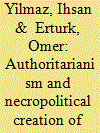

|
|
|
|
|
| Summary/Abstract |
One of the most widely used and influential ways of creating foundational myths for authoritarian legitimation is to construct a necropolitical narrative around the significance of dying for the nation, homeland, state and the leader, i.e. martyrdom. Mbembe’s concept ‘necropolitics’ (the right of the sovereign to determine who shall live and who shall die) has been expanded to include the pollical instrumentalization of martyrdom narratives. However, the literature has not analyzed the necropolitical martyr-icons. This paper aims to address this gap by looking at two historical episodes in Turkey, one in the 1930s dominated by secularists and post-2016 dominated by Islamists.
|
|
|
|
|
|
|
|
|
|
|
|
|
|
|
|
|
|
|
|
|